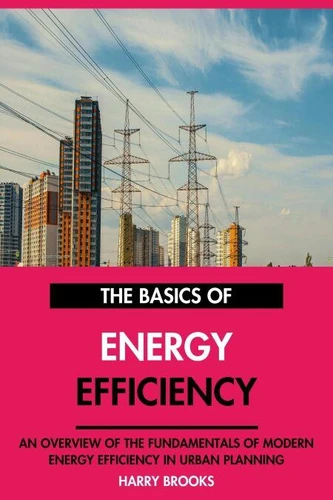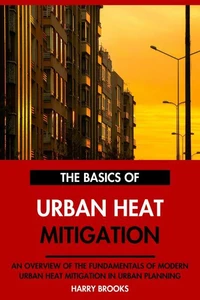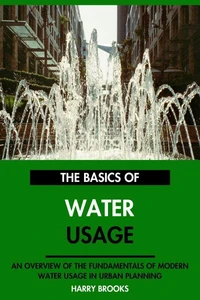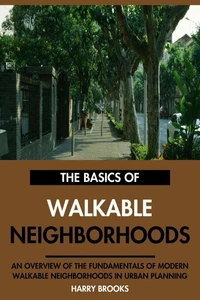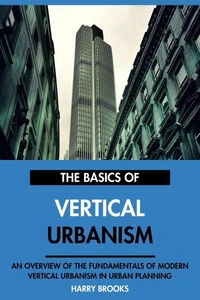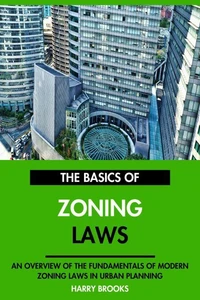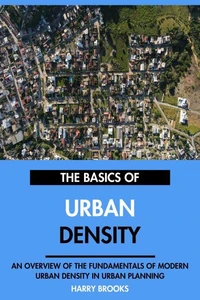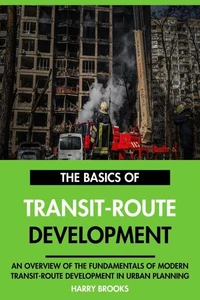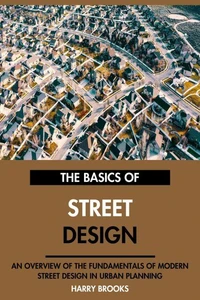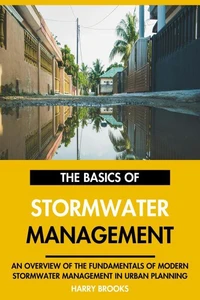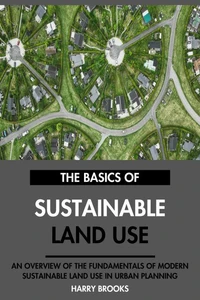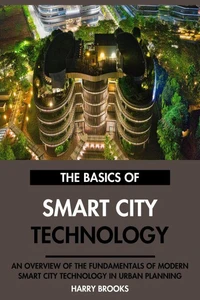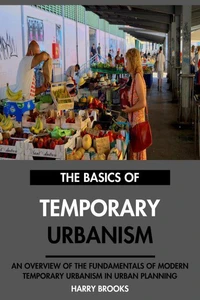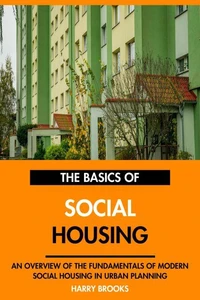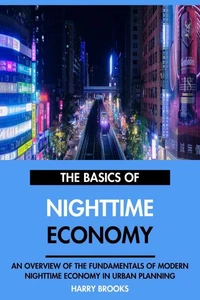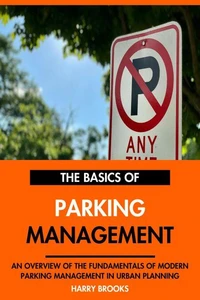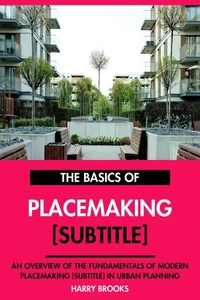The Basics of Modern Energy Efficiency: An Overview of the Fundamentals of Energy Efficiency in Urban Planning.
Par :Formats :
Disponible dans votre compte client Decitre ou Furet du Nord dès validation de votre commande. Le format ePub protégé est :
- Compatible avec une lecture sur My Vivlio (smartphone, tablette, ordinateur)
- Compatible avec une lecture sur liseuses Vivlio
- Pour les liseuses autres que Vivlio, vous devez utiliser le logiciel Adobe Digital Edition. Non compatible avec la lecture sur les liseuses Kindle, Remarkable et Sony
- Non compatible avec un achat hors France métropolitaine
 , qui est-ce ?
, qui est-ce ?Notre partenaire de plateforme de lecture numérique où vous retrouverez l'ensemble de vos ebooks gratuitement
Pour en savoir plus sur nos ebooks, consultez notre aide en ligne ici
- FormatePub
- ISBN8231726318
- EAN9798231726318
- Date de parution11/08/2025
- Protection num.Adobe DRM
- Infos supplémentairesepub
- ÉditeurWalzone Press
Résumé
As we stand at the crossroads of environmental challenges and urban growth, the need for energy efficiency has never been more pressing. This eBook delves into the intricate relationship between energy and efficiency, particularly within the context of urban planning. The modern world is witnessing unprecedented urbanization, with more than half of the global population now residing in cities. This trend poses significant challenges, including increased energy demand, greenhouse gas emissions, and resource depletion.
Addressing these challenges requires a comprehensive understanding of energy efficiency and its vital role in shaping sustainable urban environments. Energy efficiency is not merely a technical concept; it is a philosophy that permeates various aspects of urban planning. It encompasses the design of buildings, transportation systems, and infrastructure, all aimed at minimizing energy consumption while maximizing functionality and livability.
The principles of energy efficiency are rooted in the idea that we can achieve more with less, a notion that resonates deeply in a world grappling with finite resources and environmental degradation. This eBook aims to provide readers with a thorough overview of energy efficiency in urban planning, exploring its fundamental concepts, practical applications, and the myriad benefits it offers. Each chapter will delve into specific aspects of energy efficiency, from the basics of energy consumption to advanced strategies for integrating renewable energy sources into urban environments.
By examining real-world examples and case studies, readers will gain valuable insights into how cities can effectively implement energy-efficient practices and policies. The importance of energy efficiency extends beyond environmental concerns; it is also a matter of economic viability and social equity. As cities strive to create inclusive and resilient communities, energy efficiency can serve as a catalyst for economic growth, job creation, and improved quality of life.
By reducing energy costs for residents and businesses, cities can foster economic development while simultaneously addressing pressing social issues, such as poverty and inequality. Throughout this eBook, we will emphasize the collaborative nature of urban planning and the critical role that various stakeholders play in advancing energy efficiency initiatives. From government agencies and private developers to community organizations and residents, everyone has a part to play in creating a more sustainable urban future.
By fostering partnerships and encouraging public engagement, cities can harness the collective power of their communities to drive meaningful change. As we embark on this exploration of energy efficiency in urban planning, it is essential to recognize that the journey is ongoing. The challenges we face today are complex and multifaceted, requiring innovative solutions and a commitment to continuous improvement.
By embracing energy efficiency as a fundamental principle of urban planning, we can create cities that are not only more sustainable but also more vibrant, equitable, and resilient. In the chapters that follow, we will delve deeper into the various dimensions of energy efficiency, examining its implications for urban design, transportation, and community engagement. We invite you to join us on this journey as we uncover the transformative potential of energy efficiency in shaping the cities of tomorrow.
Addressing these challenges requires a comprehensive understanding of energy efficiency and its vital role in shaping sustainable urban environments. Energy efficiency is not merely a technical concept; it is a philosophy that permeates various aspects of urban planning. It encompasses the design of buildings, transportation systems, and infrastructure, all aimed at minimizing energy consumption while maximizing functionality and livability.
The principles of energy efficiency are rooted in the idea that we can achieve more with less, a notion that resonates deeply in a world grappling with finite resources and environmental degradation. This eBook aims to provide readers with a thorough overview of energy efficiency in urban planning, exploring its fundamental concepts, practical applications, and the myriad benefits it offers. Each chapter will delve into specific aspects of energy efficiency, from the basics of energy consumption to advanced strategies for integrating renewable energy sources into urban environments.
By examining real-world examples and case studies, readers will gain valuable insights into how cities can effectively implement energy-efficient practices and policies. The importance of energy efficiency extends beyond environmental concerns; it is also a matter of economic viability and social equity. As cities strive to create inclusive and resilient communities, energy efficiency can serve as a catalyst for economic growth, job creation, and improved quality of life.
By reducing energy costs for residents and businesses, cities can foster economic development while simultaneously addressing pressing social issues, such as poverty and inequality. Throughout this eBook, we will emphasize the collaborative nature of urban planning and the critical role that various stakeholders play in advancing energy efficiency initiatives. From government agencies and private developers to community organizations and residents, everyone has a part to play in creating a more sustainable urban future.
By fostering partnerships and encouraging public engagement, cities can harness the collective power of their communities to drive meaningful change. As we embark on this exploration of energy efficiency in urban planning, it is essential to recognize that the journey is ongoing. The challenges we face today are complex and multifaceted, requiring innovative solutions and a commitment to continuous improvement.
By embracing energy efficiency as a fundamental principle of urban planning, we can create cities that are not only more sustainable but also more vibrant, equitable, and resilient. In the chapters that follow, we will delve deeper into the various dimensions of energy efficiency, examining its implications for urban design, transportation, and community engagement. We invite you to join us on this journey as we uncover the transformative potential of energy efficiency in shaping the cities of tomorrow.
As we stand at the crossroads of environmental challenges and urban growth, the need for energy efficiency has never been more pressing. This eBook delves into the intricate relationship between energy and efficiency, particularly within the context of urban planning. The modern world is witnessing unprecedented urbanization, with more than half of the global population now residing in cities. This trend poses significant challenges, including increased energy demand, greenhouse gas emissions, and resource depletion.
Addressing these challenges requires a comprehensive understanding of energy efficiency and its vital role in shaping sustainable urban environments. Energy efficiency is not merely a technical concept; it is a philosophy that permeates various aspects of urban planning. It encompasses the design of buildings, transportation systems, and infrastructure, all aimed at minimizing energy consumption while maximizing functionality and livability.
The principles of energy efficiency are rooted in the idea that we can achieve more with less, a notion that resonates deeply in a world grappling with finite resources and environmental degradation. This eBook aims to provide readers with a thorough overview of energy efficiency in urban planning, exploring its fundamental concepts, practical applications, and the myriad benefits it offers. Each chapter will delve into specific aspects of energy efficiency, from the basics of energy consumption to advanced strategies for integrating renewable energy sources into urban environments.
By examining real-world examples and case studies, readers will gain valuable insights into how cities can effectively implement energy-efficient practices and policies. The importance of energy efficiency extends beyond environmental concerns; it is also a matter of economic viability and social equity. As cities strive to create inclusive and resilient communities, energy efficiency can serve as a catalyst for economic growth, job creation, and improved quality of life.
By reducing energy costs for residents and businesses, cities can foster economic development while simultaneously addressing pressing social issues, such as poverty and inequality. Throughout this eBook, we will emphasize the collaborative nature of urban planning and the critical role that various stakeholders play in advancing energy efficiency initiatives. From government agencies and private developers to community organizations and residents, everyone has a part to play in creating a more sustainable urban future.
By fostering partnerships and encouraging public engagement, cities can harness the collective power of their communities to drive meaningful change. As we embark on this exploration of energy efficiency in urban planning, it is essential to recognize that the journey is ongoing. The challenges we face today are complex and multifaceted, requiring innovative solutions and a commitment to continuous improvement.
By embracing energy efficiency as a fundamental principle of urban planning, we can create cities that are not only more sustainable but also more vibrant, equitable, and resilient. In the chapters that follow, we will delve deeper into the various dimensions of energy efficiency, examining its implications for urban design, transportation, and community engagement. We invite you to join us on this journey as we uncover the transformative potential of energy efficiency in shaping the cities of tomorrow.
Addressing these challenges requires a comprehensive understanding of energy efficiency and its vital role in shaping sustainable urban environments. Energy efficiency is not merely a technical concept; it is a philosophy that permeates various aspects of urban planning. It encompasses the design of buildings, transportation systems, and infrastructure, all aimed at minimizing energy consumption while maximizing functionality and livability.
The principles of energy efficiency are rooted in the idea that we can achieve more with less, a notion that resonates deeply in a world grappling with finite resources and environmental degradation. This eBook aims to provide readers with a thorough overview of energy efficiency in urban planning, exploring its fundamental concepts, practical applications, and the myriad benefits it offers. Each chapter will delve into specific aspects of energy efficiency, from the basics of energy consumption to advanced strategies for integrating renewable energy sources into urban environments.
By examining real-world examples and case studies, readers will gain valuable insights into how cities can effectively implement energy-efficient practices and policies. The importance of energy efficiency extends beyond environmental concerns; it is also a matter of economic viability and social equity. As cities strive to create inclusive and resilient communities, energy efficiency can serve as a catalyst for economic growth, job creation, and improved quality of life.
By reducing energy costs for residents and businesses, cities can foster economic development while simultaneously addressing pressing social issues, such as poverty and inequality. Throughout this eBook, we will emphasize the collaborative nature of urban planning and the critical role that various stakeholders play in advancing energy efficiency initiatives. From government agencies and private developers to community organizations and residents, everyone has a part to play in creating a more sustainable urban future.
By fostering partnerships and encouraging public engagement, cities can harness the collective power of their communities to drive meaningful change. As we embark on this exploration of energy efficiency in urban planning, it is essential to recognize that the journey is ongoing. The challenges we face today are complex and multifaceted, requiring innovative solutions and a commitment to continuous improvement.
By embracing energy efficiency as a fundamental principle of urban planning, we can create cities that are not only more sustainable but also more vibrant, equitable, and resilient. In the chapters that follow, we will delve deeper into the various dimensions of energy efficiency, examining its implications for urban design, transportation, and community engagement. We invite you to join us on this journey as we uncover the transformative potential of energy efficiency in shaping the cities of tomorrow.

